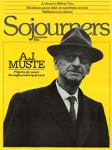One thing that helps keep Ronald Reagan on my list of fellow human beings is that he has something in common with A.J. Muste: the love of jelly beans. A.J. had a jelly bean jar on his desk.
During the time I worked in that warren of peace offices at 5 Beekman Street, near City Hall in Lower Manhattan, occasionally I made the jelly bean run so the jar wouldn't run dry. At editorial board meetings of Liberation magazine, A.J. would sit on a folding chair looking very bony in his baggy trousers and rolled-up shirt sleeves, regularly reaching into his jelly bean jar while discussing articles under consideration. On occasion he was interrupted in these meetings to take urgent calls. At least two times the caller was Martin Luther King Jr., who had first heard of nonviolence and Gandhi when A.J. came to speak at King's seminary.
A.J. loved baseball. He went to ball games whenever he could and followed baseball news as carefully as he followed world news. I think he was a Yankee fan. During the World Series, he followed every pitch.
He loved poetry, often recited from memory, and was in effect the poetry editor for Liberation. One of the joys of those meetings was hearing him read aloud the submissions he especially liked.
A.J. was one of those able to make peace within the peace movement, which at times seemed to contain enough division and animosity, and enough combative egos, to spark World War III. He chaired meetings of coalitions that emerged during the Vietnam War—coalitions that might well have collapsed without his healing gifts. Again and again he helped us find a way.
He was very sensitive to the people around him. One of those was Edie Snyder, his secretary. Edie had found her way to the peace movement through the accident of an employment agency that had been notified of an opening on the Fellowship of Reconciliation staff. What sort of office is that, Edie wanted to know. Maybe a marriage bureau, she was told.
A.J. hired her the next day, and she stayed with him for nearly a decade, until his death. He kept track of birthdays, and on one of hers, she found a long-stemmed rose standing tall on her desk when she arrived. There was no card, but she knew it was his gift. But what moved her more was the disappearance of the rose some days later. A.J. had removed it before the petals began to fall.
One of the most joyous times with A.J. came in the fall of 1965 when he took part in a retreat with Thomas Merton at the Abbey of Gethsemani in rural Kentucky. A.J. had recently undergone eye surgery for cataracts. The bandages had been removed only a day or two before, and he was wearing his new glasses for the first time. It was as if he had been blind and his sight had been miraculously restored. He kept looking at all sorts of things the rest of us took for granted. He was in a state of undisguised, contagious wonder that made me think of something G.K. Chesterton had written: "I am astonished that people are not astonished."
A.J. always had a gift for astonishment, but never more so than after his operation. He kept pointing at things—icons, wildflowers, pictures in books, things on the wall of Merton's hermitage—and saying, "Look at this!"
Jim Forest was general secretary of the International Fellowship of Reconciliation and a Sojourners contributing editor when this article appeared. During his career, he often worked with A.J. Muste and spent 1963 on the staff of Liberation magazine, sharing an office with Muste.

Got something to say about what you're reading? We value your feedback!
